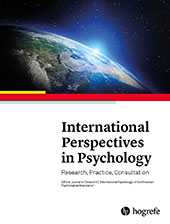International Perspectives During the Time of COVID-19
2020 has already proven to be a year of seismic societal upheavals. We are seeing tragic losses of life and livelihoods and appalling racist crimes, but also opportunities for radical systemic change and progress toward greater diversity and inclusion. Examples include securing access to decent public health care, to social justice, and to equitable opportunities for more sustainable livelihoods. This issue of International Perspectives in Psychology broaches some of these intersectional possibilities—for change and development—in interconnected ways.
Our July contents continue an evolving mental health focus in International Perspectives in Psychology (Furnham & Swami, 2018). Two articles converge on gendered mental health needs. They address the provision of evidence-informed inclusive mental health services in Romania and Mexico, concerning postnatal depression and schizophrenia (respectively, Swami, Vintila, Goian, Tudorel, & Bucur, 2020, and Ponting, Delgadillo, Rivera-Olmedo, & Yarris, 2020). A Policy Brief focuses on addressing non-suicidal self injury in schools (Hasking, Bloom, Lewis, & Bartens, 2020). Relatedly, two further Policy Briefs converge on addressing systemic biases within health care systems. These briefs offer compelling and cogent indigenous perspectives on more inclusive nationwide policies for accessing travel assistance and meal provision in caring for whānau Māori in public health systems (respectively, Masters-Awatere, Murphy, Helmhout, Flavell, & Cormack, 2020; Masters-Awatere, Graham, Scott, & Atotoa-Carr, 2020). Indigenous perspectives, wherever they be, are inherently international, not only within countries but also across them (Waimarie Nikora et al., 2017).
As a set, the current articles and policy briefs presage two upcoming special issues: Humanity on the Move (https://www.apa.org/pubs/journals/ipp/call-for-papers-human-mobility) and Addressing Global Changes in the World of Work in the Wake of the Covid-19 Pandemic (https://www.apa.org/pubs/journals/ipp/call-for-papers-global-changes-covid-19). Special issues like these clearly resonate with some diversity and inclusion concerns. They chime with opportunities for change across a range of international settings and landscapes. Freedom of movement and of access to decent work are in jeopardy as the world continues to struggle with striking the right balance between lives and livelihoods, work and well-being, and above all, respect for the sanctity and value of human life.
An additional message in this Editorial is to ask our readers and researchers to send us your ideas for ways in which this journal can keep doing more to help “improve the lives of people around the world” (from our Instructions to Authors). Clearly, we have an opportunity in front of us as a society, being highlighted by manifestations globally and locally, to change our world for the better. It would be strange indeed if international psychology, and people’s perspectives across it, were not centrally relevant to those processes, and to the zeitgeist. With that commitment and value in mind, we would most warmly welcome suggestions for new special issues, innovative formats, debates, and discussions on how international perspectives in psychology can respond and contribute (send your suggestions to us at s.
In that same spirit of coordination and solidarity going forward, please do keep in mind each of the other publications in and across the International Psychology Division (D52). The D52 website (https://www.div52.net) connects all branches and publication outlets within and across the Division. This site contains key information about division membership, purpose, mission, and resource. The online newsletter International Psychology Bulletin shares information on new books, international events, people, and issues around the globe (https://www.div52.net). International Psychology Bulletin does not publish research articles, however. This last function is the role of this journal, whose mission, purpose, ethos, and ambit can be found in our Masthead, and Instructions to Authors, contained in this volume and which can also be consulted on the journal’s own website (https://www.apa.org/pubs/journals/ipp).
Please do read on and send us your international perspectives in this time of Covid.
References
(2018). Mental health literacy: A review of what it is, and why it matters. International Perspectives in Psychology: Research, Practice, Consultation, 7, 240–257. 10.1037/ipp0000094
(2020). Developing a policy, and professional development for school staff, to address and respond to nonsuicidal self-injury in schools. International Perspectives in Psychology: Research, Practice, Consultation, 9, 176–179. 10.1037/ipp0000143
(2020). Meal provision needed for caregivers who stay with a child in hospital. International Perspectives in Psychology: Research, Practice, Consultation, 9, 185–189. 10.1037/ipp0000131
(2020). National travel assistance entitlements are inaccessible to whānau Māori. International Perspectives in Psychology: Research, Practice, Consultation, 9, 180–184. 10.1037/ipp0000140
(2020). A qualitative analysis of gendered experiences of schizophrenia in an outpatient psychiatric hospital in Mexico. International Perspectives in Psychology: Research, Practice, Consultation, 9, 159–175. 10.1037/ipp0000141
(2020). Mental health literacy of maternal and paternal postnatal depression in a community sample of Romanian adults. International Perspectives in Psychology: Research, Practice, Consultation, 9, 147–158. 10.1037/ipp0000130
(2017).
Indigenizedinternationalisation: Developments and lessons from two Aotearoa/New Zealanduniversities . In G. RichH. TakooshianU. Gielen (Eds.), International psychology: Perspectives and profiles. International applications of psychology (IAP) cultural psychology series (pp. 129–42). Washington, DC: APA.



